新目标英语八年级上第3单元知识点总
新目标八年级英语上册Unit3重点单词讲解

.true adj. 真正的;真实的 come true 实现,达到 truly adv. 真正地,真实地 truth n. 真相;事实
.careful adj. 小心的;认真的; careless 粗心的 carefully adv. 小心地;认真地; 常用短语:
2)Nothing serious. 不严重。 3)He is serious about the English exam.
他对这次英语考试很认真。 14. Are you kidding? 你在开玩笑吗? 15. as long as 只要;与…一样长 eg.1)My ruler is as long as yours.
我经常和我的好朋友吉姆分享我的故事。
. get some information 得到一些信息 不可数名词
2)We will go as long as the weather is good.
3)As long as you need my help, I will stay. 4)Jim lived in China as long as ten years.
bring out the best\worst in sb 把某人最好\最坏的一面激发出来 My teacher brings out the best in me. 我的老师把我最好的一面激 发出来。
eg.1)I was touched. 我很感动。 2) It touched me. 它使我很感动。 3)The story is touching. 那个故事令人感动。
.break-broke-broken v.打破
broken adj. 破碎的
人教版新目标八年级英语上册1、2、3、4单元知识点总结材料

新目标八年级英语上册第一单元Unit 1.How often do you exercise?I. 重点短语归纳:on weekends 在周末1. go to the movies 去看电影2. look after=take care of 照顾、照看3. surf the internet 上网4. healthy lifestyle 健康的生活方式5. go skateboarding 去滑滑板watch TV看电视6. keep healthy=stay healthy = keep in good health 保持健康keep + 形容词表保持某种状态do some reading 阅读7. exercise= take/do (much) exercise=do sports锻炼8. eating habits 饮食习惯9. take more exercise 做更多的运动10. the same as 与什么相同11. once a month一月一次12. be different from 不同13. twice a week一周两次.three times a week一周三次14. make a difference to 对什么有影响As teachers, you must believe that you can make a difference to the li ves of your students. 身为教师,你们必须坚信你们能够影响学生的一生。
A false step will make a great difference to my future.错走一步对我的前程来说会产生很大影响。
15.how often 多久一次,询问动作发生的频率一般用once a week ,twice a month ,every day ,sometimes等回答。
新目标英语八年级(上)Unit 3知识要点归纳

知识要点归纳互动课堂【重点词组或短语】1.play the drums 打鼓 2.run fast 跑得快3.jump high 跳得高 4.work as hard as sb.和某人一样努力工作5.get up early 起早床 6.sing well 唱得好7.have fun 玩得高兴8.the one with shorter hair 头发较短的那个9.care about 关心;在意10.as long as 只要;既然11.be different from 与……不同;与……有差异12.bring out 使显现;使表现出13.the same as 和……相同;与……一致14.in fact 事实上;实际上15.be similar to 与……相像(类似)的16.primary school 小学【重难点句子】1.She also sings more loudly than Tara.她唱歌也比泰拉声音大。
2.For me,a good friend likes to do the same things as me.对于我来说,好朋友喜欢跟我做相同的事情。
3.Who is smarter,your mother or your father?你妈妈和你爸爸谁更聪明?4.It ’s not necessary to be the same.没有必要相同。
5.I think a good friend makes me laugh.我认为好朋友会让我笑。
6.My mother told me a good friend is like a mirror.我妈妈告诉我好朋友就像一面镜子。
7.So it ’s not easy for me to make friends.因此对我来说交朋友不容易。
8.My best friend helps to bring out the best in me.我最好的朋友帮我把最好的方面发掘出来。
人教新目标英语八年级上册Unit3知识点总结 练习(无答案)

人教新目标英语八年级上册Unit 3 I m more outgoing than my sister.知识点汇总与练习本单元的话题:谈论事物对比,学习形容词比较级。
本单元的语法:学习形容词比较级。
(语法:见课本第113页至115页)一、本单元的短语和知识点:1.(P17,图片) play + the +乐器play the drums打鼓比较play +球类play basketball打篮球both…and…两者都(后面的动词用复数形式)Both Tom and Jim are students. 汤姆和吉姆都是学生。
2.(P18,2d) the singing competition 歌咏比赛the most important 最重要的3.(P20,1a)be good at+名词\代词\V ing:擅长,在某方面做得好He is good at math.他擅长数学(math为名词)I am good at playing basketball.我擅长打篮球。
(play为动词)4.(P20,1a)make sb do sth:让某人做某事He makes me help him.他让我帮助他。
5.(P20,1b)the same as与…相同His book is the same as my book.他的书与我的书一样。
6. (P20,1b)be talented in sth:在某方面有天赋He is talented in music.他在音乐方面有天赋。
7.(P21,2b,1段2行)be like:像… The books are like friends.书像朋友。
8.(P21,2b,1段)make friends (with sb):(和某人)交朋友He often makes friends with children.他经常和孩子们交朋友.enjoy doing sth:喜欢做某事Tom enjoys reading.汤姆喜欢读书。
初二英语上册(人教新目标)Unit_3_I'm_more_outgoing_than_my_sister_知识点总结

初二英语上册(人教新目标)Unit 3 I'm more outgoing than my sister.知识点总结一、重点词汇better·原文再现Sam plays them better than Tom.萨姆比汤姆打得好一些。
·基本用法adv. better 更好,此处是副词well的比较级,它也是形容词good的比较级。
且good和well的最高级都是best。
This coat looks better than that one. (good的比较级)这件外套看起来比那件好。
Mary learns English better than I. (well的比较级)玛丽的英语学得比我好。
·知识拓展---相关句型/结构had better (not) do sth.“最好(别)做某事”。
如:You’d better not be late again.你最好别再迟到了。
建议:搜索相关题目时,在关键词中输入better。
loudly·基本用法adv. loudly 大声地,喧闹地,吵闹地On hearing the joke, they began to laugh loudly.一听到笑话,他们就大笑起来。
as ...as·原文再现Tara works as hard as Tina.塔拉和蒂娜一样学习勤奋。
·基本用法as…as意为“与……一样”。
表示两者的同级比较,两个as之间用形容词或副词的原形,第一个as是连词,后面接比较的另一方。
其否定表达为not as/ so …as,意为“与……不一样”。
如:He works as had as before.他同以前一样努力工作。
His English is not as/so good as mine.他的英语不如我的好。
competition·原文再现Did you like the singing competition yesterday, Anna?安娜,你喜欢昨天的唱歌比赛吗?·基本用法n. competition 竞争;作可数名词时,意为“比赛”,通常指体力、技巧、能力方面的竞赛。
人教新目标八年级英语上册Unit 3 I'm more outgoing than my sister.知识点归纳

人教新目标八年级英语上册Unit 3I'm more outgoing than my sister.知识点归纳第1课时Section A(1a-2d)·loud 响亮地,大声地,高声地。
侧重发出的音量大,传得远,一般多用来修饰read, speak, talk, laugh 等动词,相当于aloud。
如:Speak louder, please. We can't hear you. 请再大点声。
我们听不见。
·loudly 常与ring, knock (敲)等动词连用,含有“喧闹”或“嘈杂”的意味。
如:Suddenly the bell on the wall rang loudly. 墙上的铃突然大声响起来。
·aloud 出声地,大声地。
强调发出的声音能被听见,常与read, call等词连用。
如:Please read the text aloud. 请大声朗读这篇课文。
(2)which相关用法·which作代词时,可单独作疑问词。
如:Which is your book? 哪一本是你的书?Which are your books? 哪一些是你的书?·which作形容词时,其后接单数或复数名词。
如:Which book is yours?=Which is your book? 哪本书是你的?Which shoes are hers?=Which are her shoes? 哪双鞋是她的?(3)win与beat用法辨析两者均可作动词,意为“赢”,但用法不同:·win (won, won)后接比赛、竞赛、战斗、奖品、钱等名词。
如:Our team won the football match. 我们的队赢得了足球比赛。
·beat (beat, beaten)后接竞争对手。
如:I beat him at the tennis. 我打网球赢了他。
八年级英语上第3单元知识讲解及练习含答案人教版新目标

新目标英语八年级上第3单元知识讲解及练习含答案Unit 3What are you doing for vacation?【重要词汇概览】babysit v. 临时受雇照顾(婴儿)at home在家Tibet某某Hawaii夏威夷(美国州名)sightseeing n. 观光;游览fishing n. 捕鱼;钓鱼rent v. 租用;出租plan n. & v. 计划;设计;筹划Greece 希腊finally adv. 最后地;最终decide v. 决定;下决心;解决lake n. 湖;湖泊region n. 地方;区域countryside n. 乡下;农村;乡村forget v. (forgot, forgot forgotten) 忘记;忘却return v. 后来;归去;归还Paris 巴黎(法国首都)tourist n. 旅行者;游客【重要词组概览】go sightseeing去观光旅行take walks去散步go fishing去钓鱼take a vacation去度假think about 考虑;思考decide on 决定the Great Lakes 五大湖(加拿大与美国之间的五个大湖)a no-stress vacation 一个没有压力的假期Hong Kong某某how long多久get back回来San Francisco旧金山(美国加利福尼亚州西部港市)sports camp运动野营go bike riding骑自行车旅行go camping 去野营go hiking去远足the Great Wall 长城have a good time玩得很高兴,过得很愉快【语法知识聚焦】一、本单元学习用现在进行时表示将要发生的动作,例如:1. What are you doing for vacation?你假期准备干什么?I'm visiting my grandmother.我准备去看我的奶奶。
新目标八年级英语上册第三单元知识点总结(Unit4Howdoyougettoschool?)

新目标八年级英语上册第三单元知识点总结(Unit 4 How doyou get to school? )Unit 4 How do you get to school?一.短语归纳1. take the subway to … = go to … by subway 搭地铁2. take the train to … = go to … by train 坐火车3. take a bus to … = go to …by bus = go to … on a bus 乘坐公共汽车4. take a taxi to … = go to … by taxi 坐的士5. ride a bike/ bicycle to… = go to … by bike/ bicycle 骑自行车6. walk to… = go to … on foot 步行7. take a car to… = go to … in a car= go to … by car 坐汽车8. get to school 到达学校get to=arrive in/at=reach 到达 (in加大地方at加小地方)9. 10 kilometers from school 离学校10公里(远)10. from…to… 从…到… from his home to school 从他家到学校11. how (用于提问状态和交通工具)怎样how long 用来询问时间的长度(用于提问时间段多长(时间))或物体的长度how often (用于提问频率)多久时间一次how far (用于提问距离)多远how many 用于提问数量)多少how much(用于提问数量/价钱)多少/多少钱how soon“过多久”,用来询问某事要在多久以后才能发生12. have a quick breakfast 快速地吃早餐13. leave for school 出发去学校14. the early bus 早班车15. take sb. to school 带某人去学校Then the early bus takes him to school.然后,他乘坐早班车到学校16. bus ride 搭公车的路程17. bus stop 公车亭18. bus station 公车站bus stop 是指小站,bus station指大的站,比如汽车站。
人教新目标版八年级英语上册Unit3语法、知识点归纳及训练
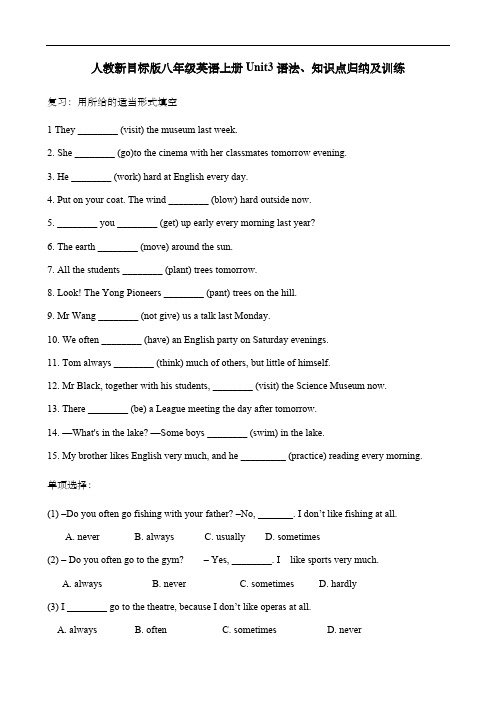
人教新目标版八年级英语上册Unit3语法、知识点归纳及训练复习:用所给的适当形式填空1 They ________ (visit) the museum last week.2. She ________ (go)to the cinema with her classmates tomorrow evening.3. He ________ (work) hard at English every day.4. Put on your coat. The wind ________ (blow) hard outside now.5. ________ you ________ (get) up early every morning last year?6. The earth ________ (move) around the sun.7. All the students ________ (plant) trees tomorrow.8. Look! The Yong Pioneers ________ (pant) trees on the hill.9. Mr Wang ________ (not give) us a talk last Monday.10. We often ________ (have) an English party on Saturday evenings.11. Tom always ________ (think) much of others, but little of himself.12. Mr Black, together with his students, ________ (visit) the Science Museum now.13. There ________ (be) a League meeting the day after tomorrow.14. —What's in the lake? —Some boys ________ (swim) in the lake.15. My brother likes English very much, and he _________ (practice) reading every morning.单项选择:(1) –Do you often go fishing with your father? –No, _______. I don’t like fishing at all.A. neverB. alwaysC. usuallyD. sometimes(2) – Do you often go to the gym? – Yes, ________. I like sports very much.A. alwaysB. neverC. sometimesD. hardly(3) I ________ go to the theatre, because I don’t like operas at all.A. alwaysB. oftenC. sometimesD. never(4) He says he will come to see us tomorrow afternoon.A. sometimeB. some timeC. sometimesD. some times(5) Speak aloud, please! I can _____ hear you.A. almostB. hardlyC. usuallyD. sometimes(6) My cousin wants to keep slim. She does exercise every morning and __ eats meat.A. hardlyB. alwaysC. usuallyD. often(7) —Miss Zhou is very popular with the students.—Yes. Her classes are_________ lively and interesting.A. alwaysB. sometimesC. hardlyD. never(8) —Have you ever been to Disneyland?—No, ______.I hope I can go there next year.A. alwaysB. sometimesC. neverD. often(9) —Zhang Lili, "the most beautiful teacher", has moved us deeply.—Yes, and she is__________ popular with her students.A. sometimesB. neverC. alwaysD. hardly(10) I don’t think fast food is good for our health, so I _______ go to MacDonald.A. hardlyB. alwaysC. usuallyD. often语法学习:形容词是用来修饰名词或不定代词,说明事物和人的性质和特征的一类词,在句子中用作定语、表语、宾语补足语;而副词用以修饰动词、形容词或其他副词,在句子中作状语、表语、补语和定语。
新目标英语八年级英语上册第三单元Section A知识点归纳
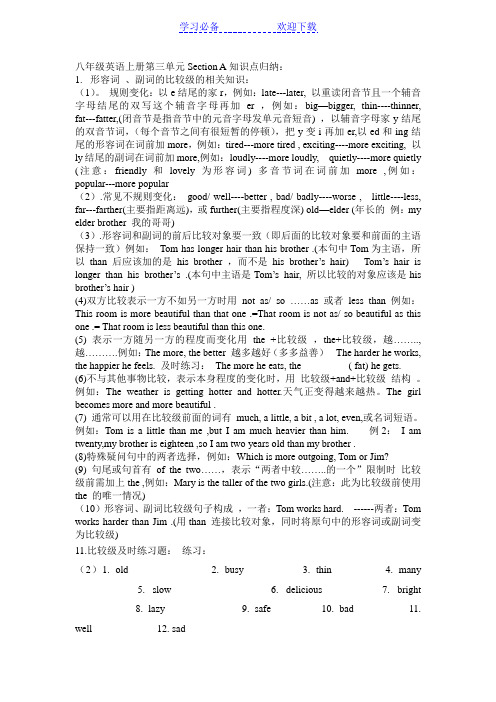
八年级英语上册第三单元Section A知识点归纳:1.形容词、副词的比较级的相关知识:(1)。
规则变化:以e结尾的家r,例如:late---later, 以重读闭音节且一个辅音字母结尾的双写这个辅音字母再加er ,例如:big—bigger, thin----thinner, fat---fatter,(闭音节是指音节中的元音字母发单元音短音) ,以辅音字母家y结尾的双音节词,(每个音节之间有很短暂的停顿),把y变i再加er,以ed和ing结尾的形容词在词前加more,例如:tired---more tired , exciting----more exciting, 以ly结尾的副词在词前加more,例如:loudly----more loudly, quietly----more quietly (注意:friendly和lovely 为形容词) 多音节词在词前加more ,例如:popular---more popular(2).常见不规则变化:good/ well----better , bad/ badly----worse , little----less, far---farther(主要指距离远),或further(主要指程度深) old—elder (年长的例:my elder brother 我的哥哥)(3).形容词和副词的前后比较对象要一致(即后面的比较对象要和前面的主语保持一致)例如:Tom has longer hair than his brother .(本句中Tom为主语,所以than 后应该加的是his brother ,而不是his brother’s hair) Tom’s hair is longer than his brother’s .(本句中主语是Tom’s hair, 所以比较的对象应该是his brother’s hair )(4)双方比较表示一方不如另一方时用not as/ so ……as 或者less than 例如:This room is more beautiful than that one .=That room is not as/ so beautiful as this one .= That room is less beautiful than this one.(5) 表示一方随另一方的程度而变化用the +比较级,the+比较级,越……..,越……….例如:The more, the better 越多越好(多多益善)The harder he works, the happier he feels. 及时练习:The more he eats, the _________( fat) he gets. (6)不与其他事物比较,表示本身程度的变化时,用比较级+and+比较级结构。
人教新目标八年级英语上册Unit 3 I'm more outgoing than my sister知识点总结和习题(含答案)
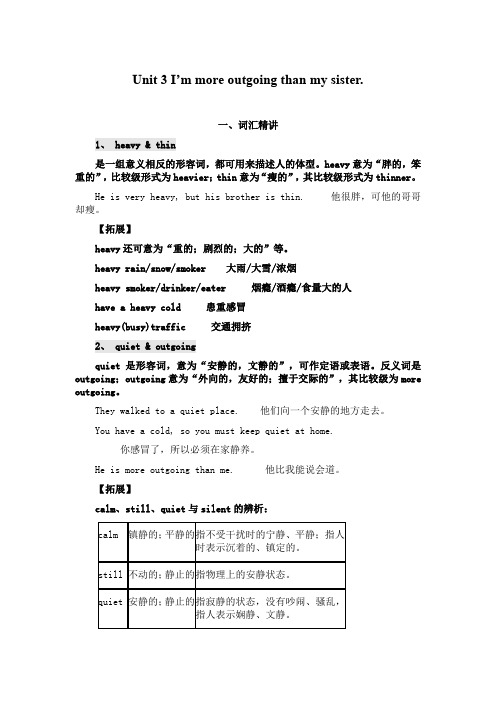
那个小女孩对书感兴趣。
8、 though
(1)though 可以作连词,意为“虽然;即使;纵然”,放在从句的开头和 中间均可。
Though it was raining, we were still working.
虽然下着雨,但我们仍然坚持工作。
(2)though 还可以作副词,意为“然而;但是”,一般放在句末。
Be quiet, everyone. The teacher is coming. 了。
同学们,安静!老师来
We shouldn’t keep silent when the teacher asks us some questions.
当老师问我们问题时,我们不应该保持沉默。
注意:quiet 意为“安静的”,quite 意为“相当”。
More than one boy knows how to play the computer games.
不止一个男孩知道怎样玩电脑游戏。
What he said makes us happy. 他所说的话使我们很高兴。
Don’t keep the door open.
别把门开着。
We made John our monitor.
It was impossible for him to do so much homework. He finished it though.
他不可能完成这么多作业,然而他做完了。
【拓展】
(1)though 和 although 的辨析:
1)两者都可用作连词,意义相同,但 although 常放在从句开头的位置, 不用于从句中间;
而 though 放在从句的开头和中间均可。
Although they are poor, they are happy.=Though they are poor,they are happy.= Poor though they are, they are happy. 虽然他们很穷,但很快 乐。
八年级英语上册 Unit 3 I'm more outgoing than my sister短语、语法知识点汇总 (新版)人教新目标版
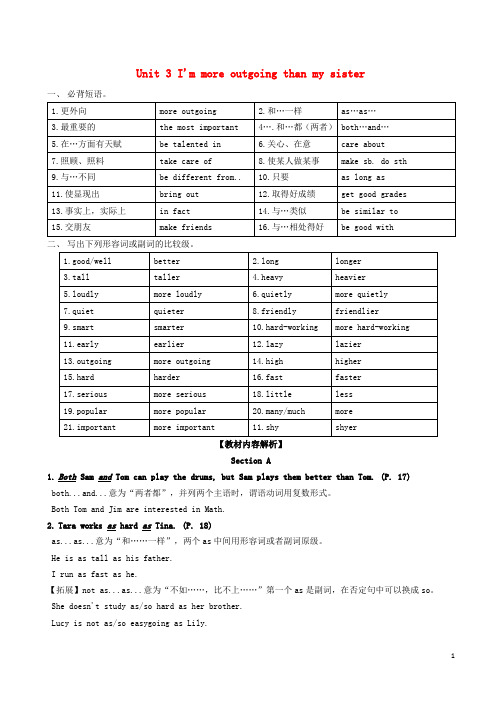
Unit 3 I'm more outgoing than my sister一、必背短语。
二、写出下列形容词或副词的比较级。
【教材内容解析】Section A1.Both Sam and Tom can play the drums, but Sam plays them better than Tom. (P. 17) both...and...意为“两者都”,并列两个主语时,谓语动词用复数形式。
Both Tom and Jim are interested in Math.2.Tara works as hard as Tina. (P. 18)as...as...意为“和……一样”,两个as中间用形容词或者副词原级。
He is as tall as his father.I run as fast as he.【拓展】not as...as...意为“不如……,比不上……”第一个as是副词,在否定句中可以换成so。
She doesn't study as/so hard as her brother.Lucy is not as/so easygoing as Lily.3.Oh, which one was Lisa?(P. 18)which表示“哪一个”,表示在一定数量中进行选择;what用于选择范围较大或者不明确时,表示选择人或物的种类。
There are some books in the box. Which one is yours?What is in the box?4.You can tell that Lisa really wanted to win, though.(P. 18)(1) win表示“赢得”后接比赛、奖项等表示物的名词作宾语;beat表示“打败”,后接某人、团队等表示人的名词作宾语。
They finally beat the other side and won the basketball match.Who won the first prize in the singing contest.(2)这里的though作副词,表示“可是、然而”,放在句末,前用都好隔开。
新版新目标英语八年级上册unit3知识点

Unit3 I’m more outgoing than my sisterSection A1. He has shorter hair than Sam. 他的头发比萨姆的短。
than 比……(用于adj adv比较级之后)当两个人或物进行比较时,要用adj比较级。
比较级+ than表示比......更......。
一般adj或adv比较级是在词后加-er。
但要注意比较的对象。
2.反意疑问句: 在陈述句后附加一个简短问句,征询肯定或否定的意见,或者希望得到陈述句所说的得到证实。
(1)肯定陈述句+否定提问Lily is a student, isn’t she? Lily will go to China, won’t she?(2)否定陈述句+肯定提问She doesn’t come from China, does she? You haven’t finished homework, have you?(3)提问部分用代词而不用名词Lily is a student, isn’t she?(4)陈述句中含有否定意义的词,如little, few, never, nothing, hardly等。
其反意疑问句用肯定式。
He knows little English, does he?他一点也不懂英语,不是吗?They hardly understood it, did they? 他们几乎不明白,不是吗?3.a little, much a lot a bit ,far,any,no等可以+比较级4.Tara works as hard as Tina. 塔拉学习跟蒂娜一样努力。
...(not)as + adj或adv原级+ as... 原级比较,......和......(不) 一样(1)...not as + adj或adv原级+ as... 表示双方在某个方面不同His English is not as good as hers. 他英语不如她的好。
人教新目标英语八年级上册Unit3单元课堂笔记
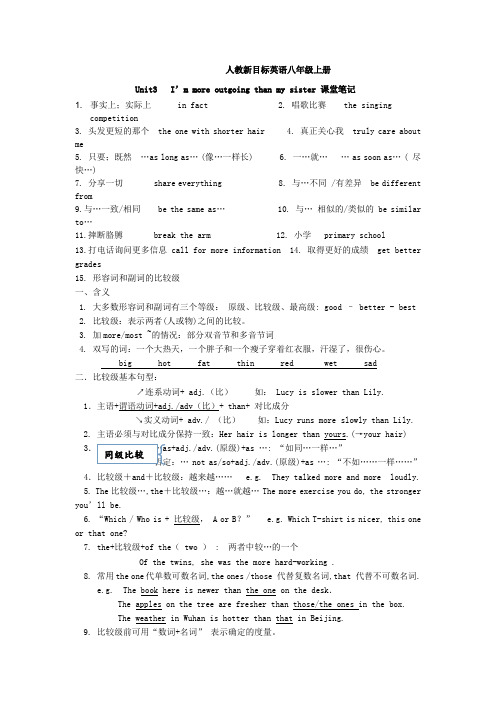
人教新目标英语八年级上册Unit3 I’m more outgoing than my sister课堂笔记1. 事实上;实际上 in fact2. 唱歌比赛 the singingcompetition3. 头发更短的那个 the one with shorter hair4. 真正关心我 truly care about me5. 只要;既然…as long as… (像…一样长)6. 一…就… … as soon as… ( 尽快…)7. 分享一切 share everything 8. 与…不同 /有差异 be different from9.与…一致/相同be the same as… 10. 与… 相似的/类似的 be similar to…11.摔断胳膊 break the arm 12. 小学 primary school13.打电话询问更多信息 call for more information 14. 取得更好的成绩 get better grades15. 形容词和副词的比较级一、含义1. 大多数形容词和副词有三个等级:原级、比较级、最高级: good – better - best2. 比较级:表示两者(人或物)之间的比较。
3. 加more/most ~的情况:部分双音节和多音节词4. 双写的词:一个大热天,一个胖子和一个瘦子穿着红衣服,汗湿了,很伤心。
big hot fat thin red wet sad二.比较级基本句型:↗连系动词+ adj.(比)如: Lucy is slower than Lily.1.主语+谓语动词+adj./adv(比)+ than+ 对比成分↘实义动词+ adv./ (比)如:Lucy runs more slowly than Lily.2. 主语必须与对比成分保持一致:Her hair is longer than yours.(→your hair)3adj./adv.(原级)+as …: “如同…一样…”not as/so+adj./adv.(原级)+as …: “不如……一样……”4.比较级+and+比较级:越来越…… e.g. They talked more and more loudly.5. The比较级…,the+比较级…:越…就越… The more exercise you do, the stronger you’ll be.6. “Which / Who is + 比较级, A or B?” e.g. Which T-shirt is nicer, this one or that one?7. the+比较级+of the( two ) : 两者中较…的一个Of the twins, she was the more hard-working .8. 常用the one代单数可数名词,the ones /those 代替复数名词,that 代替不可数名词.e.g. The book here is newer than the one on the desk.The apples on the tree are fresher than those/the ones in the box.The weather in Wuhan is hotter than that in Beijing.9. 比较级前可用“数词+名词” 表示确定的度量。
新目标英语八年级上册1至6单元知识点总结

八年级上册1-6单元知识点总结第一单元一、应掌握的单词:1、exercise既可以做名词,也可以做动词,表示“锻炼,运动”时,是不可数名词,表示“练习,体操”时,是可数名词。
2、skateboard【动词】意为“踩滑板;参加滑板运动”,skate【动词】意为“滑冰;溜冰”,board【名词】意为“板”。
3、hardly=almost not 几乎不几乎不 4、active【形容词】意为“活跃的;积极的”,它的名词形式是activity.5、about=around大约大约 6、of course= sure=certainly当然当然 7、look after=take care of 照顾照顾 8、different【形容词】意为“不同的;有区别的” ,它的名词形式是difference.9、although=though虽然虽然 10、a lot of=lots of后面跟可数名词的复数或不可数名词。
11、must【情态动词】意为“必须”,后面跟动词原形,相当于have to.12、less【形容词】意为“较小的;更小的;较少的;更少的”,它是little的比较级。
的比较级。
二、应掌握的词组:1. go to the movies 去看电影去看电影2. watch TV看电视看电视3. surf the internet 上网上网 ,上网冲浪,上网冲浪 4.read English books读英语书读英语书5.do homework做家庭作业做家庭作业(do housework做家务事)做家务事)6.all students所有的学生100%7.most students大多数学生51-99% (= most of the students)8.some students 一些学生1-50%9.no students没有学生0%10.as for至于至于11. be good for 对什么有益对什么有益(be bad for对什么有害)对什么有害)12. come home from school放学回家放学回家 13. eating habits 饮食习惯饮食习惯饮食习惯14.pretty good非常好,不错非常好,不错15. junk food垃圾食物垃圾食物16. healthy lifestyle 健康的生活方式健康的生活方式健康的生活方式 17.kind of=a little=a little bit有点有点 18. help sb to do sth帮助某人做某事,帮助某人做某事, =help sb with sth 19. go skateboarding 去划板去划板去划板20. keep healthy=stay healthy 保持健康21. exercise=take (much) exercise=do sports锻炼锻炼22. take more exercise 做更多的运动做更多的运动 23. the same as 与什么相同与什么相同24. once a month一月一次一月一次25. be different from 不同不同26. twice a week一周两次一周两次一周两次27. make a difference to 对什么有影响对什么有影响 28. how often 多久一次多久一次多久一次29. shop=go shopping=do some shopping 购物购物30. activity survey活动调查活动调查31. eat less meat吃更少的肉吃更少的肉32. want to do sth 想做某事想做某事33. want sb to do sth想要某人做某事想要某人做某事 34. get good grades取得好成绩取得好成绩取得好成绩35. a lot of vegetables=many vegetables许多蔬菜许多蔬菜36. keep/be in good health保持健康保持健康三、 应掌握的句子:1.How often do you watch TV? 你多久看一次电视?你多久看一次电视?How often + 助动词(助动词(do 或does) + 主语主语 + do sth.?这个句型是用来提问在某一特定这个句型是用来提问在某一特定的时间里进行某个动作的次数,即“多久一次”。
人教新目标英语八年级上册Unit-3知识点归纳总结

人教新目标英语八年级上册Unit 3 I’m more outgoing than my sister.知识点一、单词1. outgoing: liking to meet other people, enjoying their company and being friendlytowards them.eg. He is more outgoing than his brother.2. both: used with plural nouns to mean “the two” or“the one as well as the other”eg. Both women were French. They were both French.Both of my sisters live in London. They both live in London.※both … and …: not only … but also …eg. Both his mother and his father will be there.3. quiet: making very little noiseeg. her quiet voice Could you keep the kids quiet while I’m on the phone? quiet: without many people or much noise; not disturbed, peacefuleg. a quiet street They lead a quiet life. have a quiet drinkquiet: (of a person) tending not to talk very mucheg. She was quiet and shy.4. win: to be the most successful in a competition, race, battle, etc.to get sth as a result of a competition, race, battle, etc.to achieve or get sth that you want, especially by your own effortseg. France won by six goals to two against Denmark.to win election, a game or a war Ok, you win. I’ll admit I was wrong.※beat: beat sb at sth. to defeat sb/ team in a game or competitioneg. He beat me at chess. the most difficult team to beat5. truly: used to emphasize that a particular statement, feeling.(用于感觉)“真诚的,诚恳的,衷心的”eg. I’m truly sorry that things had to end like this.※really: use to say what is actually the fact or the truth about sth(表明事实或真相)“事实上,真实地,真正地”eg. What do you really think about it?They are not really my aunt and uncle.used to emphasize sth you are saying or an opinion you are giving(强调观点)“确实,的确”eg. I want to help, I really do. Now I really must go.I really and truly am in love this time.used to emphasize an adjective or adverb(强调形容词、副词的语气)eg. I’m really sorry.used often in negative sentences, to reduce the force of sth you are saying(用于否定句以减弱语气)eg. I don’t really agree with that. It doesn’t really matter.“Do you enjoy the book?”“Not really”used to express interest in or surprise at what sb is saying(表示感兴趣或惊讶)eg. “We’re going to Japan next month.”“Oh, really?”※true 与real辨析:real: actually existing or happening and not imagined or pretended事实存在,非凭空想象,并非假冒的true: connected with facts rather than things have been invented or guessed 符合事实的,如实的,并非杜撰,猜测的true 还可以表示“正确的”,real没有这种用法。
新目标英语八年级英语上册第三单元SectionA知识点归纳

八年级英语上册第三单元Section A知识点归纳:1.形容词、副词的比较级的相关知识:(1)。
规则变化:以e结尾的家r,例如:late---later, 以重读闭音节且一个辅音字母结尾的双写这个辅音字母再加er ,例如:big—bigger, thin----thinner, fat---fatter,(闭音节是指音节中的元音字母发单元音短音) ,以辅音字母家y结尾的双音节词,(每个音节之间有很短暂的停顿),把y变i再加er,以ed和ing结尾的形容词在词前加more,例如:tired---more tired , exciting----more exciting, 以ly结尾的副词在词前加more,例如:loudly----more loudly, quietly----more quietly (注意:friendly和lovely 为形容词) 多音节词在词前加more ,例如:popular---more popular(2).常见不规则变化:good/ well----better , bad/ badly----worse , little----less, far---farther(主要指距离远),或further(主要指程度深) old—elder (年长的例:my elder brother 我的哥哥)(3).形容词和副词的前后比较对象要一致(即后面的比较对象要和前面的主语保持一致)例如:Tom has longer hair than his brother .(本句中Tom为主语,所以than 后应该加的是his brother ,而不是his brother’s hair) Tom’s hair is longer than his brother’s .(本句中主语是Tom’s hair, 所以比较的对象应该是his brother’s hair )(4)双方比较表示一方不如另一方时用not as/ so ……as 或者less than 例如:This room is more beautiful than that one .=That room is not as/ so beautiful as this one .= That room is less beautiful than this one.(5) 表示一方随另一方的程度而变化用the +比较级,the+比较级,越……..,越……….例如:The more, the better 越多越好(多多益善)The harder he works, the happier he feels. 及时练习:The more he eats, the _________( fat) he gets. (6)不与其他事物比较,表示本身程度的变化时,用比较级+and+比较级结构。
单元语法汇总 八年级英语上册Unit3I'mmoreoutgoingthanmysister人教新目标八年级英语上 4 (2)
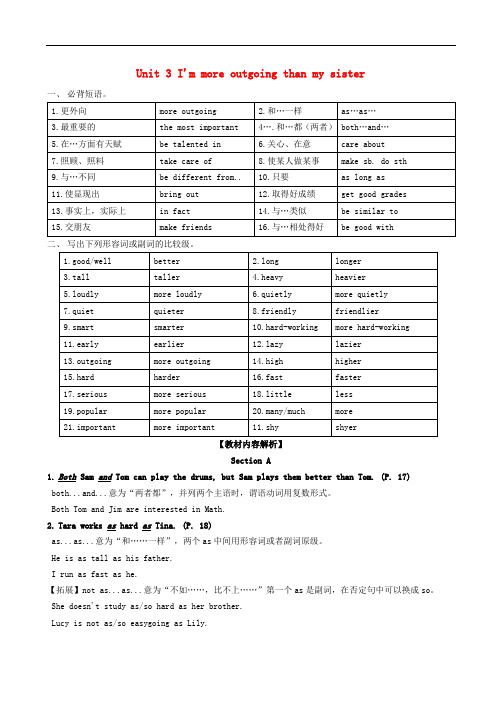
Unit 3 I'm more outgoing than my sister一、必背短语。
二、写出下列形容词或副词的比较级。
【教材内容解析】Section A1.Both Sam and Tom can play the drums, but Sam plays them better than Tom. (P. 17) both...and...意为“两者都”,并列两个主语时,谓语动词用复数形式。
Both Tom and Jim are interested in Math.2.Tara works as hard as Tina. (P. 18)as...as...意为“和……一样”,两个as中间用形容词或者副词原级。
He is as tall as his father.I run as fast as he.【拓展】not as...as...意为“不如……,比不上……”第一个as是副词,在否定句中可以换成so。
She doesn't study as/so hard as her brother.Lucy is not as/so easygoing as Lily.3.Oh, which one was Lisa?(P. 18)which表示“哪一个”,表示在一定数量中进行选择;what用于选择范围较大或者不明确时,表示选择人或物的种类。
There are some books in the box. Which one is yours?What is in the box?4.You can tell that Lisa really wanted to win, though.(P. 18)(1) win表示“赢得”后接比赛、奖项等表示物的名词作宾语;beat表示“打败”,后接某人、团队等表示人的名词作宾语。
They finally beat the other side and won the basketball match.Who won the first prize in the singing contest.(2)这里的though作副词,表示“可是、然而”,放在句末,前用都好隔开。
新目标英语八年级上Unit 3重难点解析
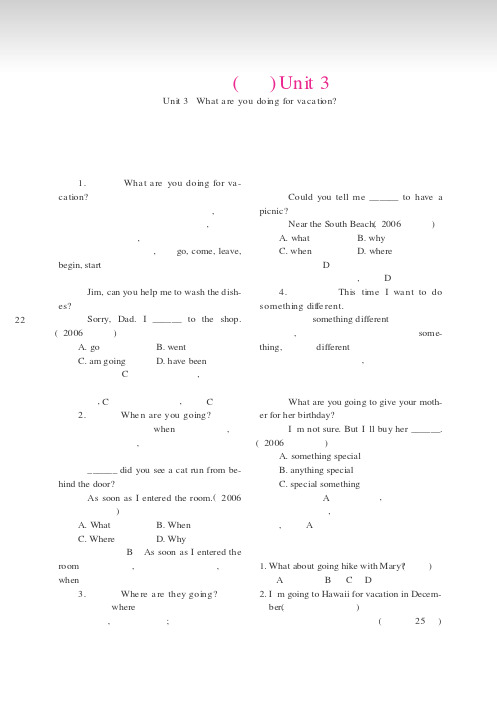
1.【原句】Wha t a re you doing for va -ca tion?【讲解】句子时态是现在进行时,但表示的却是将来的意义。
现代英语中,用现在进行时来表示将来,意味着动作马上就要发生。
表示位移的动词,如go,come,leave,begin,start 等都有这种用法。
【真题】—Jim,can you help me to wash the dish-es?—Sorry,Dad.I ______to the shop.(2006江西省)A.goB.wentC.am goingD.have been【点拨】选C 。
按逻辑来推理,吉姆当时不能帮他爸爸洗碗的原因是他正在或将要去干某事,C 选项表示“将要”,故选C 。
2.【原句】Whe n are you going?【讲解】本句中的when 是疑问副词,用来对时间进行提问,意为“什么时候”。
【真题】—______did you see a cat run from be-hind the door?—As soon as I entered the room.(2006山东省临沂市)A.WhatB.WhenC.WhereD.Why【点拨】选B 。
As soon as I entered the room 是时间状语,意为“我一进房间”,故用when 来提问。
3.【原句】Whe re a re they going?【讲解】where 是用来询问去向或位置的疑问副词,意为“去哪里;在哪里”。
【真题】—Could you tell me ______to have apicnic?—Near the South Beach.(2006浙江省)A.whatB.whyC.whenD.where【点拨】选D 。
从答语可看出空白处应当是表示“去野餐”的去向,故选D 。
4.【原句】This time I wa nt to dosomething dif fe rent.【讲解】something different 意为“不同的事情”,该短语的中心词是不定代词some-thing ,形容词different 作后置定语。
人教版新目标八年级英语上册第三单元大归纳

★语法全解 1.形容词、副词的比较级含义 大多数形容词和副词有三个等级:原级,比较 级和最高级。其中比较级表示“更…”,用于两者 (人和事物)之间的比较,说明“前者比后者 更……”,比较级前常用even, much, a lot等修 饰。
第七页,共15页。
2.形容词、副词的比较级的构成 (1)规则变化
第五页,共15页。
rry works harder than Huang lei . 拉里学习比黄磊刻苦。
句1 中quieter是形容词quiet的比较级,more serious是serious的比较级;句2中more outgoing 是形容词outgoing的比较级;句3中 better是副词well的比较级;句4中harder是副词 hard的比较级。下面就是形容词和副词比较级的 讲解。
第二页,共15页。
14.touch one’s heart感动某人
15.in fact 事实上 16.make friends交朋友 17.be good at… 擅长于…
18. the other其他的
19.be similar to与…相似的/类似的
20.be good with 善于与…相处的
He is running more and more slowly.
他跑Байду номын сангаас越来越慢。
(3)“the+比较级,the+比较级”意为 越…就越… The more you read, the more you know. 你书读的越多,你知道的就越多。
第十三页,共15页。
(4)as…as…意为“与…一样…”,否定形式为 not as/so…as,意为不如……,与…不一样…,也 是一种表达比较级的形式,相当于“less+形容 词/副词+than”.但as/so…as中间用形容词或副 词的原级。
- 1、下载文档前请自行甄别文档内容的完整性,平台不提供额外的编辑、内容补充、找答案等附加服务。
- 2、"仅部分预览"的文档,不可在线预览部分如存在完整性等问题,可反馈申请退款(可完整预览的文档不适用该条件!)。
- 3、如文档侵犯您的权益,请联系客服反馈,我们会尽快为您处理(人工客服工作时间:9:00-18:30)。
Unit 3I’m more outgoing than my sister话题:本单元以描述朋友外表和个性特征,比较个人与朋友间的差异为题材,增进朋友间的相互了解。
教学目标:使学生掌握形容词副词的比较级运用比较级来描述个人与朋友间的差异知识点1.形容词、副词比较级1规则变化○A.直接在词尾加-erfew-fewer long-longer small-smaller light-lighter tall-tallerB.以不发音的字母e结尾,直接加rNice-nicer large-largerC.以重读闭音节结尾并且末尾只有一个辅音字母,双写该辅音字母加erthin-thinner big-bigger hot-hotter wet-wetter red-redderD.以辅音字母+y结尾的,变y为i加erheavy-heavier easy-easierE.多音节和部分双音节词more +该词2不规则变化○有少数形容词、副词的比较级和最高级是不规则的,必须熟记。
good好的well好;(身体)好的, better更好的best 最好的bad,badly糟糕的,糟糕地/ill(身体)不舒服的worse更糟糕的,更糟糕地;(身体)更不舒服的worst最糟糕的,最糟糕地;(身体)最不舒服的many许多的(可数)/much许多的(不可数);非常more更多的;更most最多的;最little少的less更少的least最少的far远的;远地farther更远的;更远地further/进一步的(地)farthest最远的;最远地furthest最深刻的(地)old老的older年龄较大的;较旧的oldest年龄最大的;最旧的elder仅表兄弟姊妹之间的长幼eldest仅表兄弟姊妹之间的长幼常用句型1比较级+than当than前后所使用的动词形式相同时,通常用助动词代替后面的动词,该○动词或助动词可以省略。
Alice writes more carefully than I (do).This story is __________ interesting)than that one( is )2比较级+and+比较级或者more and more +原形意为越来越……○Spring is coming, and days are getting longer and longer.春天来了,白天越来越长了。
The little girl is more and more beautiful.这个小女孩越来越漂亮了。
3the+比较级, the+比较级意为越……就越……○The more money you make, the more you spend.钱你赚得越多,花得越多。
The sooner, the better.越快越好。
4表示对两个人或事物进行对比,并进行选择常用句型,Which/what/who +be+形容词比较○级,A or B?Who is taller, Tom or Jack?Which is better, the blue one or the yellow one?表示三者Which is the largest, Beijing, Shanghai, Suzhou?5同一类人或物在某一范围进行比较时,常用形容词比较级+than any other+名词单数意○为……比任何……都……Is Yangtze River longer than any other river in China?Shanghai is larger than any other city in China.等于the +形容词最高级+可数名词单数+of/in6当表示……是两者中更……的时,常用the +比较级+of the two the不可缺少○Tom is the thinner of the two.This boy is the smarter of the two.7和……一样……As+比较级原形+as否定not as+比较级原形+as○not so+比较级原形+as修饰形容词比较级的副词有 a little much even练习1)天越来越长了。
________________________________________________________2)她越来越漂亮了。
______________________________________________________3)天空越来越蓝了。
_____________________________________________________4)糖放的越多,水会越甜。
_________________________________________________5)污染越多,人就越容易生病。
_____________________________________________2.附加疑问句反意的附加疑问句,由肯定陈述句加简短附加疑问句构成,用于向对方证实某事eg.It’s a nice day, isn’t it?这是个好天气,不是吗?He isn’t a bad boy, is he?他不是个坏孩子,是吗?注意:在回答附加疑问句时,如果事实是肯定的,用Yes回答,翻译为,不。
如果事实是否定的,用No回答,翻译为是。
Eg. She is beautiful ,isn’t she?她很漂亮,不是吗?Yes, she is.不,她很漂亮。
No, she isn’t.是,她不漂亮了。
练习翻译下列句子:1)Thecat is so lovely,isn’tit?____________________________________________________2)Thedesk isn’t that dirty,isit?____________________________________________________3)Jacklikes playing basketball,doesn’the?___________________________________________4)Thewater isn’t so deep,isit?_____________________________________________________5)Thesky was blue in the pastdays,wasn’t?__________________________________________3.hard-working与work hardhard-working adj.努力工作的work hard v.+adv.努力工作Eg. Mary is a hard-working girl, she works hard every day.玛丽是努力学习的女孩,她每天都努力工作。
as……as 和……一样Eg.1)This apple isas red as that one.这个苹果和那个苹果一样红。
2)Mary’s bag is as new as Tom’s.玛丽的书包和汤姆的书包一样新。
3)Lucy is as quiet as Lily.露西和李丽一样安静。
4)She is as tall as Jack.她和杰克一样高。
5)She is as slim as I.她和我一样苗条。
注意否定形式not as ……as或者是not so……as1)Thisapple is not as red as that one.或者This apple is not so red as that one.1)Mary’s bag is not as new as Tom’s.或者Mary’s bag is not so red as that one.3)Lucy is not as quiet as Lily.或者Lucy is not so quiet as Lily.4)She is not as tall as Jack.或者She is not so tall as Lily.5)He is not as old as I.或者He is not so old as I.练习1)吉姆和他哥哥一样高。
_______________________________________________________2)吉姆没有他哥哥高____________________________________________________________3)这个杯子和那个杯子一样漂亮。
________________________________________________4)这个杯子没有那个杯子漂亮。
__________________________________________________5)我家电视机和李磊家的电视机一样新。
___________________________________________4.as long as只要1)用于as……as句型中,表示像……一样长Eg. My books are as new as yours.我的书和你的一样新。
2)表示时间,意思是达……之久Eg. You can keep the book as long as you like.这本书你想借多久就借多久。
3)表示条件,意思是只要,引导条件状语从句Eg. We will go as long as the weather is good.只要天气好我们就去。
练习1)只要我来了就给你说。
__________________________________________________________2)只要他去派对,玛丽就很高兴了。
_______________________________________________3)只要用心做就行了。
___________________________________________________________4)只要努力,就会有所收获。
____________________________________________________5)只要老板同意,我就过来。
_____________________________________________________5.though尽管注意though和but不能同时出现在一个句子中Eg.1)Though he is little, he knows a lot.或者He is little, but he knows a lot.虽然他很小,但是他知道很多xx。
